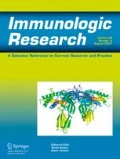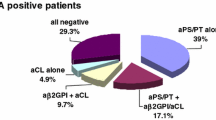Abstract
Among the diagnostic assays for anti-phospholipid syndrome (APS), lupus anticoagulant (LA) is the strongest predictor of thrombosis; however, it presents several limitations as interference with anticoagulant therapy and poor inter-laboratory agreement. Two-thirds of LA activity is apparently due to antibodies against prothrombin (PT), usually detectable by ELISA. Binding of PT to phosphatidylserine (PS) has been shown to enhance solid-phase anti-PT assay sensitivity. To determine the prevalence of antibodies against PS/PT (aPS/PT) in APS, we tested the semiquantitative QUANTA Lite® aPS/PT ELISA in a cohort of 80 APS patients. The prevalence of aPS/PT was 81.3 %, rising to 87.6 % when considering LA-positive subjects only. We observed a strong correlation between aPS/PT and LA (p = 0.006). To note, APS patients with thrombotic manifestations displayed significantly higher IgG aPS/PT titers compared to 20 aPL asymptomatic carriers (p = 0.012). To rule out a possible cross-reactivity of anti-β2 glycoprotein I antibodies (aβ2GPI) with PS/PT complex, we tested two monoclonal aβ2GPI antibodies and an affinity-purified (AP) polyclonal aβ2GPI IgG obtained from the serum of a patient reacting against both β2GPI and PS/PT. The two monoclonal antibodies did not show any reactivity against PS/PT complex, similarly the AP IgGs did not react toward PS/PT antigen while preserved their aβ2GPI activity. Our findings suggest that aPS/PT are a definite antibody population in APS. Moreover, the good correlation between aPS/PT ELISA and LA may support its use as a surrogate test for LA, particularly useful to overcome the technical limitations of the functional assay.


Similar content being viewed by others
References
Miyakis S, Lockshin MD, Atsumi T, Branch DW, Brey RL, Cervera R, Derksen RH, De Groot PG, Koike T, Meroni PL, Reber G, Shoenfeld Y, Tincani A, Vlachoyiannopoulos PG, Krilis SA. International consensus statement on an update of the classification criteria for definite antiphospholipid syndrome (APS). J Thromb Haemost. 2006;4:259–306.
Galli M, Barbui T. Antiprothrombin antibodies: detection and clinical significance in the antiphospholipid syndrome. Blood. 1999;93:2149–57.
Amengual O, Atsumi T, Koike T. Specificities, Properties, and Clinical Significance of Antiprothrombin Antibodies. Arthritis Rheum. 2003;48:886–95.
Vega-Ostertag M, Liu X, Kwan-Ki H, Chen P, Pierangeli S. A human monoclonal antiprothrombin antibody is thrombogenic in vivo and upregulates expression of tissue factor and E-selectin on endothelial cells. Br J Haematol. 2006;135:214–9.
Yang YH, Chang CJ, Chuang YH, Hsu HY, Chen PP, Chiangf BL. Identification of anti-prothrombin antibodies in the antiphospholipid syndrome that display the prothrombinase activity. Rheumatology. 2010;49:34–42.
Meroni PL, Borghi MO, Raschi E, Tedesco F. Pathogenesis of antiphospholipid syndrome: understanding the antibodies. Nature Rev Rheumatol. 2011;7:330–9.
Arvieux J, Darnige L, Caron C, Reber G, Bensa JC, Colomb MG. Development of an ELISA for autoantibodies to prothrombin showing their prevalence in patients with lupus anticoagulants. Thromb Haemost. 1995;74:1120–5.
Bevers EM, Galli M, Barbui T, Comfurius P, Zwaal RF. Lupus anticoagulant IgG’s (LA) are not directed to phospholipids only, but to a complex of lipid-bound human prothrombin. Thromb Haemost. 1991;66:629–32.
Galli M, Beretta G, Daldossi M, Bevers EM, Barbui T. Different anticoagulant and immunological properties of anti-prothrombin antibodies in patients with antiphospholipid antibodies. Thromb Haemost. 1997;77:486–91.
Galli M, Luciani D, Bertolini G, Barbui T. Anti-β2-glycoprotein I, antiprothrombin antibodies, and the risk of thrombosis in the antiphospholipid syndrome. Blood. 2003;102:2717–23.
Atsumi T, Koike K. Antiprothrombin antibody: why do we need more assays? Lupus. 2010;19:436–9.
Tincani A, Morozzi G, Villalta D, Alessandri C, Allegri F, Bistoni O, Bizzaro N, Caccavo D, Galeazzi M, Gerli R, Giovannelli L, Longobardo G, Lotzniker M, Malacarne F, Migliorini P, Parodi A, Pregnolato F, Radice A, Riccieri V, Ruffelli M, Sinico RA, Tozzoli R, Villalta D, Marcolongo R. Meroni P; Forum Interdisciplinare per la Ricerca nelle Malattie Autoimmuni (FIRMA). Antiprothrombin antibodies: comparative analysis of home made and commercial methods. A collaborative work of the FIRMA group. Clin Exp Rheumatol. 2007;25:268–74.
Forastiero R, Papalardo E, Watkins M, Nguyen H, Crisostomo M, Vandam W, Hardy J, Albesa R, Nelson V, Shums Z, Norman G, Binder W, Morin K, Kirbach C, Mattias K, Lakos G, Pierangeli SS. Evaluation of the performance of monoclonal and polyclonal antibody standards in different assays for the detection of antiphospholipid (aPL) antibodies: report of a wet workshop at the 13th international congress on antiphospholipid antibodies. Arthr Rheum. 2010;62:2251.
Balestrieri G, Tincani A, Spatola L, Allegri F, Prati E, Cattaneo R, Valesini G, Del Papa N, Meroni P. Anti-β2glycoprotein I antibodies. A marker of antiphospholipid syndrome? Lupus. 1995;4:122–30.
Meroni PL, Mari D, Monti D, Coppola R, Capri M, Salvioli S, Tincani A, Gerli R, Franceschi C. Anti-beta 2 glycoprotein I antibodies in centenarians. Exp Gerontol. 2004;39:1459–65.
Tincani A, Spatola L, Prati E, Allegri F, Ferremi P, Cattaneo R, Meroni P, Balestrieri G. The aβ2glycoprotein I activity in human anti-phospholipid syndrome sera is due to monoreactive low-affinity autoantibodies directed to epitopes located on native β2-glycoprotein I and preserved during species’ evolution. J Immunol. 1996;157:5732–8.
Roubey RAS, Eisenberg RA, Harper MF, Winfield JB. “Anticardiolipin” autoantibodies recognize β2-Glycoprotein I in the Absence of Phospholipid. Importance of Ag Density and Bivalent Binding. J Immunology. 1995;154:954–60.
Atsumi T, Ieko M, Bertolaccini ML, Ichikawa K, Tsutsumi A, Matsuura E, Koike T. Association of autoantibodies against the phosphatidylserine-prothrombin complex with manifestations of the antiphospholipid syndrome and with the presence of lupus anticoagulant. Arthritis Rheum. 2000;43:1982–93.
Jakowski TD, Wilson AR, Hill HR, Branch WD, Tebo AE. Autoantibodies against phosphatidylserine, prothrombin and phosphatidylserine-prothrombin complex: identical or distinct diagnostic tools for antiphospholipid syndrome? Clin Chim Acta. 2009;410:19–24.
Atsumi T, Amengual O, Yasuda S, Koike T. Antiprothrombin antibodies—are they worth assaying? Thromb Res. 2004;114:533–8.
Miyara M, Arnaud L, Dufat L, Diement MC. Anti-phosphatidylserine/prothrombin antibody titers are strongly correlated with lupus anticoagulant assays in patients with antiphospholipid antibodies. Arthritis Rheum. 2011;63:S7.
Bertolaccini ML, Atsumi T, Koike T, Hughes GRV, Khamashta MA. Antiprothrombin antibodies detected in two different assay systems. Prevalence and clinical significance in systemic lupus erythematosus. Thromb Haemost. 2005;93:289–97.
Forastiero R, Martinuzzo M, Pombo G, Puente D, Rossi A, Celebrin L, Bonaccorso S, Aversa L. A prospective study of autoantibody to β2-glycoprotein I and prothrombin, and risk of thrombosis. J Thromb Haemost. 2005;3:1231–8.
Bertolaccini ML, Sciascia S, Murru V, Garcia-Fernandez C, Sanna G, Khamashta M. Antibodies to phosphatidylserine/prothrombin (aPS/PT) are an independent risk factor for thrombosis in patients with systemic lupus erythematosus (SLE). Arthritis Rheum. 2011;63:S9.
von Landenberg P, Matthias T, Zaech J, Schultz M, Lorber M, Blank M, Shoenfeld Y. Antiprothrombin antibodies are associated with pregnancy loss in patients with the antiphospholipid syndrome. Am J Reprod Immunol. 2003;49:51–6.
Pengo V, Ruffatti A, Legnani C, Gresele P, Barcellona D, Erba N, Testa S, Marongiu F, Bison E, Denas G, Banzato A, Padayattil Jose S, Iliceto S. Clinical course of high-risk patients diagnosed with antiphospholipid syndrome. J Thromb Haemost. 2010;8:237–42.
Rodriguez-Garcia JL, Bertolaccini ML, Cuadrado MJ, Sanna G, Ateka-Barrutia O, Khamashta MA. Clinical manifestations of antiphospholipid syndrome (APS) with and without antiphospholipid antibodies (the so-called ‘seronegative APS’). Ann Rheum Dis. 2012;71:242–4.
Lakos G, Kiss E, Regeczy N, Tarjan P, Soltesz P, Zeher M, Bodolay E, Szucs G, Szakony S, Sipka S, Szegedi G. Anti-prothrombin and anti-annexin V antibodies imply risk of thrombosis in patients with systemic autoimmune diseases. J Rheumatol. 2000;27:924–9.
Languren M, Becerril B, Cabral AR, Fernández-Altuna LE, Pascual V, Hernández-Ramírez DF, Cabiedes J. Characterization of monoclonal anti-β2-glycoprotein-I and anti-prothrombin antibody fragments generated by phage display from a patient with primary antiphospholipid syndrome. J Autoimmun. 2006;26:57–65.
Conflict of interest
Susan Encabo, Zakera Shums, and Gary L. Norman are employees of INOVA Diagnostics, Inc.
Author information
Authors and Affiliations
Corresponding author
Rights and permissions
About this article
Cite this article
Pregnolato, F., Chighizola, C.B., Encabo, S. et al. Anti-phosphatidylserine/prothrombin antibodies: an additional diagnostic marker for APS?. Immunol Res 56, 432–438 (2013). https://doi.org/10.1007/s12026-013-8421-z
Published:
Issue Date:
DOI: https://doi.org/10.1007/s12026-013-8421-z




